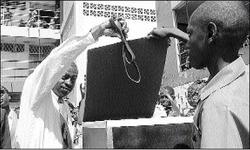Marlon Vickerman, Features Writer

In this March 2006 Gleaner photo, Dennis Kelly, principal of Charlie Smith High School, buries a strap in a makeshift coffin to symbolise the discontinuation of corporal punishment at the institution. - File
When The Gleaner team settled down inside the cosy conference room at the Ministry of Education's Education Transformation Team's (ETT) headquarters in New Kingston last week, coordinator of the Inner-City School Improvement Project, Margaret Brissett-Bolt, spoke proudly of the programme's accomplishments.
The four-year-old Inner-City School Improvement Project, spearheaded by then Minister of Education Maxine Henry-Wilson, was crafted to address the many challenges affecting schools. The major problems revolve around poor enrolment and attendance, inadequate parental involvement, underperformance, weak physical infrastructure and violence.
Asked if improving the physical structure of inner-city schools had positive spin-offs on student morale, Brissett-Bolt's response came without restraint. "Oh yes!" she exclaimed. "Can you imagine stepping into a school you can be proud of? A school that is fully paved and painted. One where everything is in order, the computer lab, the music room ... oh, can you imagine!"
Improved enrolment
Brissett-Bolt explained further that since the programme's inception, the 23 participating schools have all undergone infrastructural upgrading, a move which has led to improved enrolment.
Joseph Williams, principal of St James High School, the only inner-city school from western Jamaica affiliated with the programme, concurred. Williams, who took the reins in 2004, said the school had upgraded its science lab, established a well-equipped computer lab and carried out overall beautification exercises.
Consequently, there has been heightened interest in the institution to the point that enrolment applications have outstripped accommodation quotas, the principal revealed.
Originally designed to facilitate 1,000 pupils on either of its shift, St James High now has a student population of 2,200.
He continued: "The whole ethos of the school has changed and, as a result, the violence has decreased. It is a fact that when the students are engaged, they don't have time to get in trouble."
Williams rated the improvements as a landmark achievement for the school, which has struggled to shake off a history of violence.
The principal also praised the programme for its effect on academic performance. He cited the school's performance in the recent sitting of the Caribbean Secondary Education Certificate (CSEC) exams where St James High recorded passes in English (33 per cent) and mathematics (21 per cent), which were above the national averages (30 per cent and 15 per cent, respectively) that year.
Additionally, Williams said there was a steady increase in the number of students being promoted out of the remedial classes into mainstream sessions.
Things looking up

Dennis Kelly, principal of Charlie Smith High School, located in Arnett Gardens, Kingston, echoed Williams' point.
Kelly noted that before his institution became "big-time beneficiaries of the programme", absenteeism was significant and overall student performance was below par.
"In the last two years, our academic record has been looking up ... and I think it is due in part to the reading room that we established here through funding and support from the programme," he said. "It is equipped with computers, teaching aids and we even have specialist teachers there to assist the students."
He also boasted that in recent times, his boys, especially, have been graduating from the institution with an average of four CSEC passes, an improvement over past years.
marlon.vickerman@gleanerjm.com

